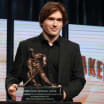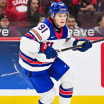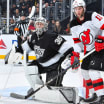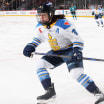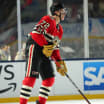Bossy recalled by Islanders teammates as 'born to score'
Hall of Fame forward dies at 65, helped New York win four straight Stanley Cup titles
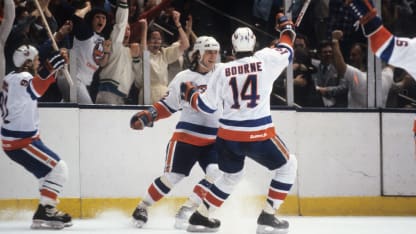
© B Bennett/Getty Images
The news was not unexpected after Bossy, who was 65, announced that he'd been diagnosed with lung cancer in an open letter on TVA Sports' website in October. But it was another blow to the group that won four straight Stanley Cup championships beginning in 1980, and that previously said tearful goodbyes this year to Clark Gillies, who died at the age of 67 after battle with cancer Jan. 21, and Jean Potvin, who died from a lengthy non-COVID illness at 72 on March 15.
"They're picking away at the best of the crop with 'Clarkie' gone and my brother, who was a major addition to our team when he came back in 1979-80," former Islanders defenseman Denis Potvin said. "We knew this was coming, of course. 'Boss' has been sick for a while. But it doesn't help when he actually does pass."
Jean Potvin, a defenseman like his younger brother, was a key role player on the first two of the dynastic Islanders' four consecutive championships. Gillies and Bossy flanked center Bryan Trottier on the top line throughout that run, which ended in the 1984 Stanley Cup Final against the Edmonton Oilers after New York won an NHL-record 19 consecutive Stanley Cup Playoff series.
Bossy, Gillies, Trottier, Denis Potvin and goalie Billy Smith went on to be inducted into the Hockey Hall of Fame along with coach Al Arbour, who died in 2015, and general manager Bill Torrey, who died in 2018. But if there was a player in the highest realm of that hierarchy, it was Bossy.
"One person has to be on the top of that pyramid and it was 'Boss,'" said former goalie Glenn "Chico" Resch, who played eight seasons for the Islanders and was on their first Stanley Cup title team in 1979-80. "The rest of us had roles, even Bryan and Clark. But 'Boss' was born to score. 'Boss' had a God-given talent to score that we all knew that you can't acquire that."
RELATED: [Islanders legend Bossy dies at 65 | Bossy was 'home run hitter' for Islanders]
After falling to the Islanders with the No. 15 pick in the 1977 NHL Draft, Bossy scored at least 50 goals in each of his first nine NHL seasons, including 53 in 1977-78 when he won the Calder Trophy, voted as the League's rookie of the year.
Bossy scored 1,126 points (573 goals, 553 assists) in 752 NHL regular-season games before a nagging back injury ended his career after 10 seasons; he retired in October 1988. Bossy is the only player in NHL history to score at least 50 goals in nine straight seasons and is tied with Wayne Gretzky for the most 60-goal seasons (five). His average of 0.76 goals per game is the best among players who have played at least 150 games.
"To have a friend like Mike and to share the humor that we did, the laughter, and every day we laughed, it was just great to be in the locker room with him," Trottier told NHL Network. "And then to have the kind of chemistry we did on the ice, especially with big Clark on the left side, it was just a very, very special time."
Part of Bossy's success came from his confidence. Potvin recalled the story of Torrey interviewing Bossy before the 1977 draft.
"Bill Torrey said, 'We're thinking of drafting you. We need a goal-scorer because we have some really good players: Trottier and 'Clarkie' and whatnot. Can you score goals?'" Potvin said. "And 'Boss' told Bill Torrey, 'I'll score 50.' And Bill tells this story as like, 'Yeah, OK.' And he scores 53. So that kind of says it all."
Bossy also won the Lady Byng Trophy, awarded annually to the NHL player voted best to combine sportsmanship, gentlemanly conduct and ability, three times (1982-83, 1983-84, 1985-86), and the Conn Smythe Trophy voted as most valuable player of the playoffs in 1981-82, when he scored 27 points (17 goals, 10 assists) in 19 games.
"He was a good man, and he was a hockey player through and through," former Islanders forward Bob Bourne said. "He studied the game, he studied the other teams before that really became available. He played on instinct so much too, a very smart player. Of course, he had a devastating shot. I think of the way [Toronto Maple Leafs center Auston] Matthews is scoring right now and Mike had that same kind of heavy, quick shot. That was his key to success. Plus, he came to play every game. He didn't take a night off."
Bourne, another member of all four of the Stanley Cup teams, lamented that Bossy's death soon after those of Jean Potvin and Gillies, whom he called "my best friend in the whole world," has been a reminder of his own mortality. But the 67-year-old also cherishes the memories they forged together, which are being pushed to the forefront again now.
Memories such as Bossy scoring in his NHL debut against the Buffalo Sabres in 1977 and scoring 50 goals in the first 50 games of the 1980-81 season to match an achievement only Maurice Richard had accomplished, in 1944-45 with the Montreal Canadiens.
"He had to score (two) in the last game against the Quebec Nordiques and he ended scoring with two minutes to go to get his 50th," Bourne said. "I remember it was a great moment for him. He was so proud of scoring, so proud. … It was amazing what he did."
Jiggs McDonald, the Islanders' television play-by-play announcer for 15 seasons beginning in 1980, recalled how Gillies would joke that if Trottier had been right-handed instead of left-handed, he would have on the receiving end of more of Trottier's great passes instead of Bossy, and "then it would be me scoring those goals, not him."
"Then, he would laugh and say, 'Yeah, sure,'" McDonald said.
McDonald laughed at the memory and a few others, but acknowledged it's been a rough first four months of the year for all connected to those Islanders. McDonald also included the death Jan. 19 of former NHL forward Randy Boyd, whose two seasons with New York (1985-1987) came after the Stanley Cup years.
"It's a slap of reality. We're all getting older," McDonald said. "Especially today, I think of Al and Bill, if there is a heaven, and the welcome they would have for Mike's arrival. It just hurts."


